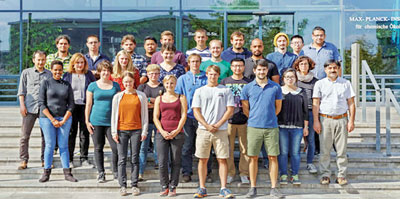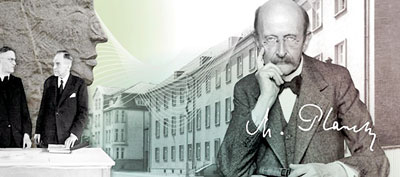Sunday Times 2
Max Planck Society, an intellectual hub for high quality research
Germany, the “Land of ideas” (German: Land der Ideen), is highly reputed for high quality, innovative, and internationally attractive first-class research and has produced more than 100 Nobel laureates since 1900. The research community of Germany is comprised of higher education institutions and non-university research institutes which include internationally renowned research organisations such as the Max Planck Society, the Fraunhofer Society, the Helmholtz Association and the Leibniz Association.

IMPRS offers a stimulating intellectual environment within an international research community
The Max Planck Society (German: Max-Planck-Gesellschaft) is a national and international icon of research and is generally considered a leading basic research organisation in Europe. In 2017, it was ranked third in the Nature index of research institutes in the world, with its research output outranked only by the Chinese Academy of Sciences and the Harvard University. Its predecessor organisation was established in 1911 as the Kaiser Wilhelm Society. The Max Planck Society was founded in 1948 and named in honour of the world-famous physicist and former president of the Kaiser Wilhelm Society, Max Planck (1858–1947), who developed the Quantum theory and the mathematical construct named Planck’s constant in physics of radiation emitted by a glowing body. The scientific excellence of this organisation is undoubtedly reflected by 18 Nobel Prizes awarded to its scientists who have dominated the fields of chemistry, physics and medicine. Konrad Lorenz (Nobel Prize in Medicine-1973), Georges Köhler (Nobel Prize in Medicine-1984), Christiane Nüsslein-Volhard (Nobel Prize in Medicine-1995), Theodor Hänsch (Nobel Prize in Physics-2005), Gerhard Ertl (Nobel Prize in Chemistry-2007) and Stefan Hell (Nobel Prize in Chemistry-2014) are, to name a few, renowned scientists who have been honoured with this prestigious award. In addition, Joachim Frank, who shared the Nobel Prize in Chemistry in 2017 is also an alumni of the Max Planck Society.
The Max Planck Society is comprised of 84 research institutes and research facilities to conduct basic research of the highest quality at the frontiers of knowledge in natural sciences, life sciences, social sciences and the humanities. Most of these institutes are located in Germany; however, some are located in other European countries (The Netherlands, Luxemburg and Italy) and even in the United States (Max Planck Florida Institute for Neuroscience in Jupiter, FL). The Max Planck Institutes offer an exciting and outstanding work environment for international researchers and young scientists to conduct state-of-the-art research under the guidance of experts. Interestingly, more than one third of the directors, about 55 percent of the PhD students and about 72 percent of the post-doctoral researchers affiliated with the Max Planck Society are bearers of non-German passports, thus creating the true spirit of an international research atmosphere.

World-famous physicist and former president of the Kaiser Wilhelm Society, Max Planck, who developed the Quantum theory and the mathematical construct named Planck’s constant in physics of radiation emitted by a glowing body.
The implementation of International Max Planck Research Schools (IMPRS) in 2000 opened the door for exceptionally talented students from Germany and foreign countries to pursue their PhD studies in many innovative and interdisciplinary research areas, for example, molecular biology, neurosciences, molecular biomedicine, chemical ecology, computer sciences, astronomy, social sciences, law and plasma physics. These schools are jointly managed by the Max Planck Institutes and German and some foreign universities and offer a structured three-year study programme which includes lectures, practical courses, outreach activities, and participation in local and international conferences. At present, there are 60 IMPRS; 26 in the chemistry, physics and technology section, 23 in the biology and medicine section, and 11 in the humanities and social sciences section to gear up junior scientists towards their doctorates while receiving excellent scientific support and interdisciplinary education to help mould their future in a positive way. The schools also provide opportunities for foreign doctoral students to familiarise themselves with research facilities in Germany and spur their interest in future cooperative activities with German research institutes. Moreover, the students have the option to attend German language classes to get acquainted with the second most commonly used scientific language in the world, despite the fact that the educational programme in IMPRS is conducted in English. The doctoral students, who have been recruited following a competitive selection process, receive a stipend or an employment contract ensuring sufficient financial support throughout their study period.
Max Planck Institutes frequently build international networks to enhance and promote scientific performance and productivity. Max Planck Society researchers are respected as esteemed research partners worldwide. The establishment of International Max Planck Centres and Partner Groups are some further programmes initiated with the aim of broadening the research horizons of Max Planck Society at an international level. Especially the outstanding junior scientists who had completed a research residency at Max Planck Institutes and returned to their home countries are encouraged to set up Partner Groups to carry out further research on a subject that is also in the interests of their previous host Max Planck institutes. Thus, more than 70 partner groups currently exist across the globe to strengthen the research through international cooperation.
On February 26, 2018, the great research giant celebrated the 70th anniversary of its foundation which was laid in the city of Göttingen. Over the years, it has made a significant service to the people with groundbreaking research findings in a vast array of disciplines, carving and fostering thousands of young scientists and also enhancing the international visibility of Germany as a hub of ideas and innovation of high quality. As an alumna of the IMPRS and the Max Planck Society, it is with great respect and honour, I pay my tribute to the Alma mater, who assisted me to broaden the knowledge, sharpen the skills and unearth the intellectual capacity to enlighten my research career.
Alles Gute zum Geburtstag ….
(The author is grateful to Dr. Karin Groten,. Angela Overmeyer and Anna Schroll, Max Planck Institute for Chemical Ecology, Jena, Germany for their guidance and assistance in preparing this article.)

